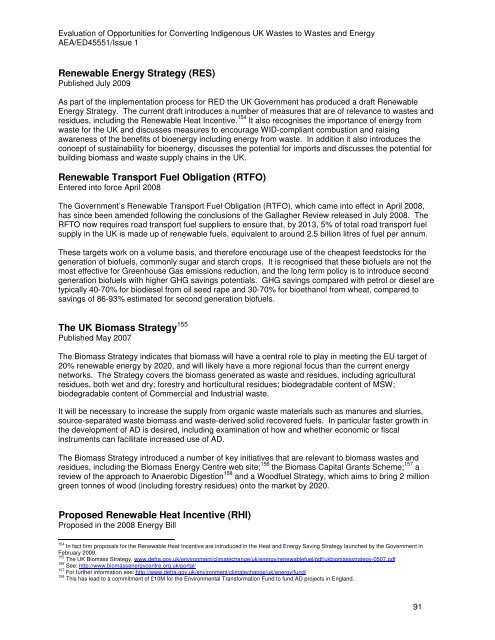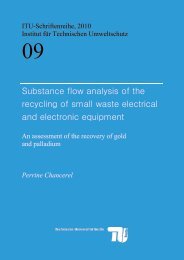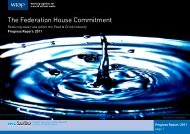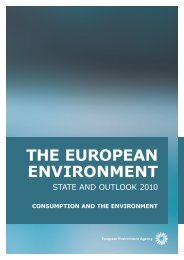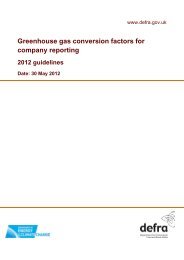to read the full report - Ecolateral by Peter Jones
to read the full report - Ecolateral by Peter Jones
to read the full report - Ecolateral by Peter Jones
You also want an ePaper? Increase the reach of your titles
YUMPU automatically turns print PDFs into web optimized ePapers that Google loves.
Evaluation of Opportunities for Converting Indigenous UK Wastes <strong>to</strong> Wastes and Energy<br />
AEA/ED45551/Issue 1<br />
Renewable Energy Strategy (RES)<br />
Published July 2009<br />
As part of <strong>the</strong> implementation process for RED <strong>the</strong> UK Government has produced a draft Renewable<br />
Energy Strategy. The current draft introduces a number of measures that are of relevance <strong>to</strong> wastes and<br />
residues, including <strong>the</strong> Renewable Heat Incentive. 154 It also recognises <strong>the</strong> importance of energy from<br />
waste for <strong>the</strong> UK and discusses measures <strong>to</strong> encourage WID-compliant combustion and raising<br />
awareness of <strong>the</strong> benefits of bioenergy including energy from waste. In addition it also introduces <strong>the</strong><br />
concept of sustainability for bioenergy, discusses <strong>the</strong> potential for imports and discusses <strong>the</strong> potential for<br />
building biomass and waste supply chains in <strong>the</strong> UK.<br />
Renewable Transport Fuel Obligation (RTFO)<br />
Entered in<strong>to</strong> force April 2008<br />
The Government’s Renewable Transport Fuel Obligation (RTFO), which came in<strong>to</strong> effect in April 2008,<br />
has since been amended following <strong>the</strong> conclusions of <strong>the</strong> Gallagher Review released in July 2008. The<br />
RFTO now requires road transport fuel suppliers <strong>to</strong> ensure that, <strong>by</strong> 2013, 5% of <strong>to</strong>tal road transport fuel<br />
supply in <strong>the</strong> UK is made up of renewable fuels, equivalent <strong>to</strong> around 2.5 billion litres of fuel per annum.<br />
These targets work on a volume basis, and <strong>the</strong>refore encourage use of <strong>the</strong> cheapest feeds<strong>to</strong>cks for <strong>the</strong><br />
generation of biofuels, commonly sugar and starch crops. It is recognised that <strong>the</strong>se biofuels are not <strong>the</strong><br />
most effective for Greenhouse Gas emissions reduction, and <strong>the</strong> long term policy is <strong>to</strong> introduce second<br />
generation biofuels with higher GHG savings potentials. GHG savings compared with petrol or diesel are<br />
typically 40-70% for biodiesel from oil seed rape and 30-70% for bioethanol from wheat, compared <strong>to</strong><br />
savings of 86-93% estimated for second generation biofuels.<br />
The UK Biomass Strategy 155<br />
Published May 2007<br />
The Biomass Strategy indicates that biomass will have a central role <strong>to</strong> play in meeting <strong>the</strong> EU target of<br />
20% renewable energy <strong>by</strong> 2020, and will likely have a more regional focus than <strong>the</strong> current energy<br />
networks. The Strategy covers <strong>the</strong> biomass generated as waste and residues, including agricultural<br />
residues, both wet and dry; forestry and horticultural residues; biodegradable content of MSW;<br />
biodegradable content of Commercial and Industrial waste.<br />
It will be necessary <strong>to</strong> increase <strong>the</strong> supply from organic waste materials such as manures and slurries,<br />
source-separated waste biomass and waste-derived solid recovered fuels. In particular faster growth in<br />
<strong>the</strong> development of AD is desired, including examination of how and whe<strong>the</strong>r economic or fiscal<br />
instruments can facilitate increased use of AD.<br />
The Biomass Strategy introduced a number of key initiatives that are relevant <strong>to</strong> biomass wastes and<br />
residues, including <strong>the</strong> Biomass Energy Centre web site; 156 <strong>the</strong> Biomass Capital Grants Scheme; 157 a<br />
review of <strong>the</strong> approach <strong>to</strong> Anaerobic Digestion 158 and a Woodfuel Strategy, which aims <strong>to</strong> bring 2 million<br />
green <strong>to</strong>nnes of wood (including forestry residues) on<strong>to</strong> <strong>the</strong> market <strong>by</strong> 2020.<br />
Proposed Renewable Heat Incentive (RHI)<br />
Proposed in <strong>the</strong> 2008 Energy Bill<br />
154<br />
In fact firm proposals for <strong>the</strong> Renewable Heat Incentive are introduced in <strong>the</strong> Heat and Energy Saving Strategy launched <strong>by</strong> <strong>the</strong> Government in<br />
February 2009.<br />
155<br />
The UK Biomass Strategy, www.defra.gov.uk/environment/climatechange/uk/energy/renewablefuel/pdf/ukbiomassstrategy-0507.pdf<br />
156<br />
See: http://www.biomassenergycentre.org.uk/portal/<br />
157<br />
For fur<strong>the</strong>r information see: http://www.defra.gov.uk/environment/climatechange/uk/energy/fund/<br />
158<br />
This has lead <strong>to</strong> a commitment of £10M for <strong>the</strong> Environmental Transformation Fund <strong>to</strong> fund AD projects in England.<br />
91


